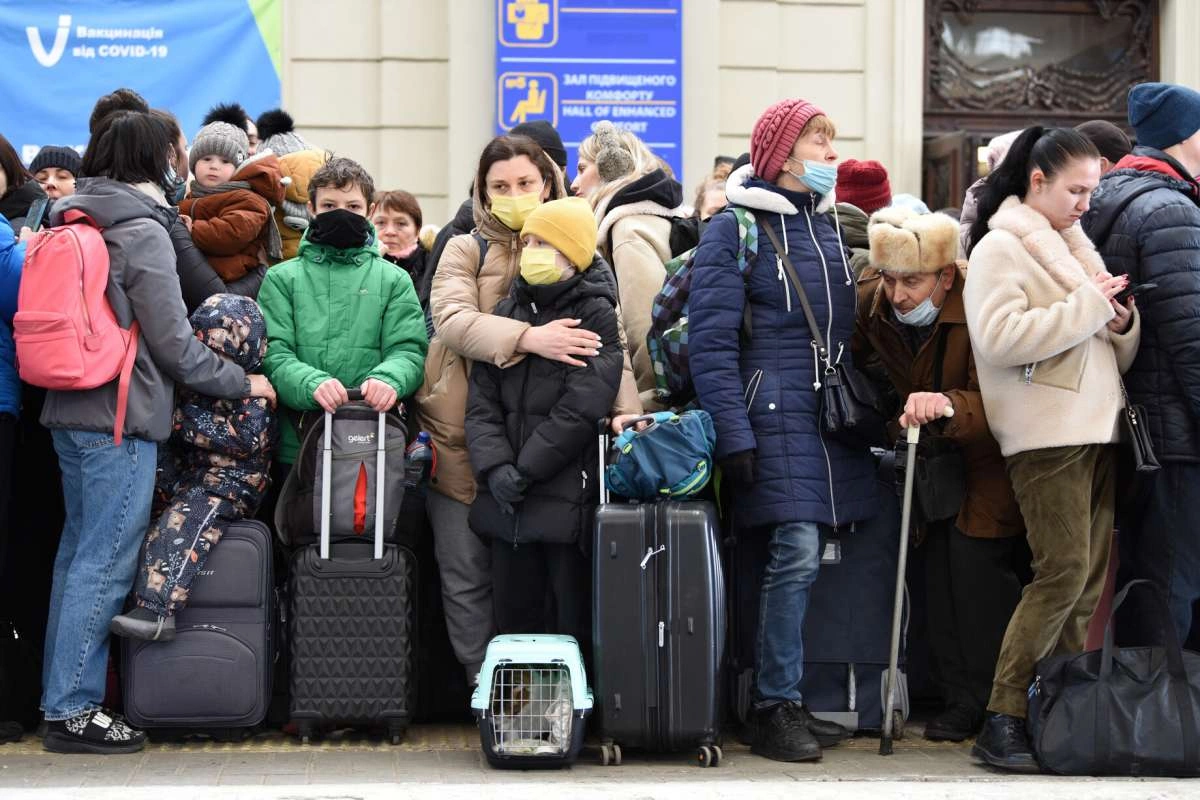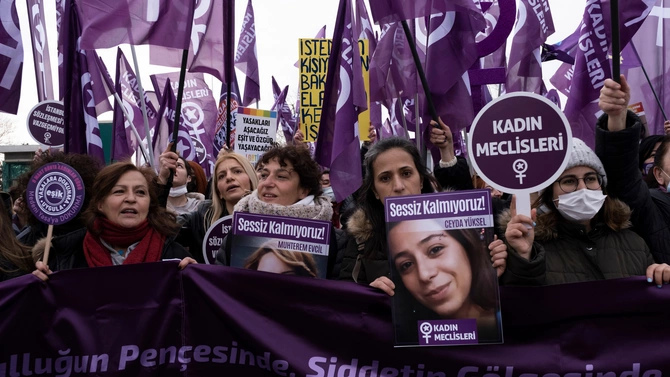
Behind the headlines of the Russian invasion and the heroic attempts to defend Ukraine, there are other far less supportive images, notably the sexualization of those who have sought sanctuary in other countries.
Over 3.5 million refugees have fled Ukraine since Russia invaded the country. Pictured here are those waiting for the train to Poland in Lviv, February 26, 2022. Image: Bumble Dee/Shutterstock
8 March has always been a lively and dynamic day in Istanbul, Turkey, where hundreds of women gather to hold a ‘Feminist Night Walk’ every year. There was a new agenda in that night walk this year, as evidenced in the placards with statements like ‘Ukrainian Women are Not for Sale.’ This slogan, captured on a photo that went viral on social media, has become an open protest against derogatory comments in Turkish social media that sexualize Ukrainian women refugees.
Sadly, refugees and immigrants would already know that these discourses are often sexualized, and refugee women are targeted because of their gender, while refugee men are often painted as sexual predators in anti-migration discourses. Despite the mainstream Western media’s relatively positive representation of Ukrainian refugees, they have not been spared such sexualized discourses. From China to Egypt, disturbing comments fetishizing Ukrainian refugee women have filled social media platforms. In Brazil, a politician has faced calls to resign after audio recordings were leaked in which he made sexist and degrading remarks about refugee women during a ‘humanitarian’ visit to Ukraine. The situation in Turkey has proved no exception. Hundreds of anonymous Turkish-language accounts posted misogynist comments sexualizing Ukrainian women on Twitter, Instagram, and other social media platforms, including the Sour Dictionary, some of them simultaneously degrading Syrian refugees and Turkish women.
However, was a very rapid backlash with prominent Turkish celebrities using the same social media platforms to post Tweets protesting the online targeting of refugee women. For example, the well-known actor and comedian Sahan Gokbahar called out those who made sexual comments about Ukrainian refugees as a bunch of ‘shameless and conscienceless ignorants’ in a viral tweet. Another celebrity who protested through Twitter was actress Songul Oden who wrote, ‘Leave women alone. Your objectification of the bodies of women for your agenda is shameful. They are one of the most vulnerable groups in war.’

Of course, these reactions were not limited to the remarks of celebrities in the online sphere but were echoed in protests from feminist activists. In the Eastern Anatolian town of Dersim, women who gathered for International Women’s Day declared their solidarity with ‘Ukrainian women who had to become migrants and refugees because of the war.’ In Istanbul, thousands of female anti-war protesters declared in Turkish, Kurdish, and Arabic that ‘We are here for refugee women who are labelled as war trophies from Syria to Ukraine.’ Similar remarks were made by the SES Women’s Platform in the capital Ankara, which stated: ‘In our neighbouring countries, refugee women are forced to leave their homes and countries because of wars. Now, it is Ukrainian women and children who are displaced because of endless war politics. Female refugees are being targeted through sexist attacks and discourses, and they have to endure all kinds of violence.’
But let’s return to that viral photo snapped by journalist Evrim Kepenek on the 8 March Feminist Night Walk. A ‘Ukrainian Women are Not for Sale’ placard is being carried by a blond-haired pale woman who, despite the immediate assumptions of the Twittersphere, is not Ukrainian herself but a Turkish activist. She took the social media opportunity to again address sexism and poverty faced by Ukrainian refugee women crossing the Polish border, calling on all feminists to work on finding solutions.
Ukrainian women, both as migrants and refugees as well as those living in their own country, are at the center of this topic, and they have their own voice and agency. Since the beginning of the war, international news and social media have already been telling the stories of the power and resistance of women and girls living in Ukraine. Some of them endured the hardship of giving birth while hiding from bombs in basements or subway stations. Others risked their lives to rescue disabled dogs from areas under attack. However, the resilience and strength of those leaving their country or already living abroad is not often the subject of the news.
Indeed, long before the 8 March protests, Ukrainian migrant women were themselves reacting to the sexist discourses in social media. For example,


Many Ukrainian women like Anastasiya have been working, living, and nurturing families in Istanbul, Antalya, and other Turkish cities since the dissolution of the Soviet Union. For example, Mayya, a Ukrainian boutique owner living for 20 years in the northwestern city of Tekirdag, is the organizer of an online network connecting local East European migrant women. Mayya has now used this network to collect donations for Ukraine, a campaign that was supported not only by Ukrainians but also Russian and Belarussian women living in the city. Meanwhile, in the southern cities of Izmir, Antalya and Adana as well, it was Ukrainian women who organized and led large demonstrations, gathering their local communities to protest Russia’s attacks.
One of the most striking examples of Ukrainian women’s resistance has been the story of a woman who put sunflower seeds in the pocket of a Russian soldier that she encountered. The idea, she said, was that these seeds ‘would grow on Ukrainian soil when he died.’ Perhaps, it is also time for the international community to similarly sow the seeds of genuine solidarity with the Ukrainian women against sexism and to acknowledge refugee and migrant women’s powerful agency.
Share on social media